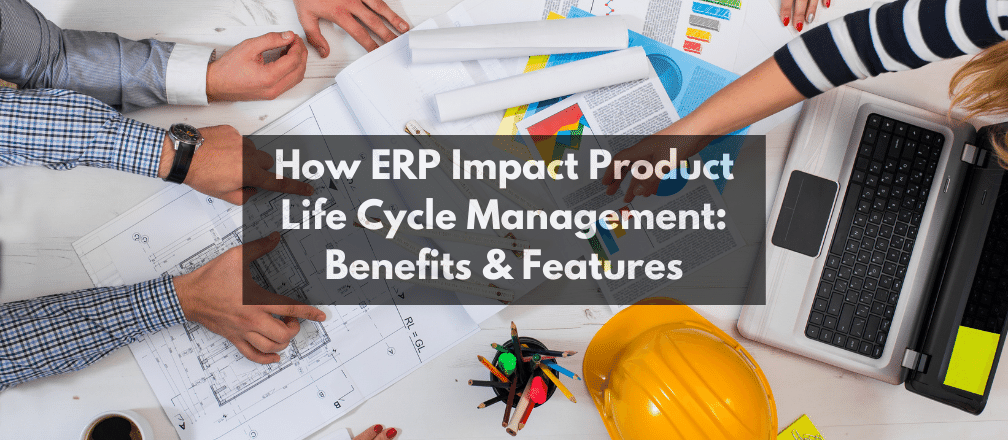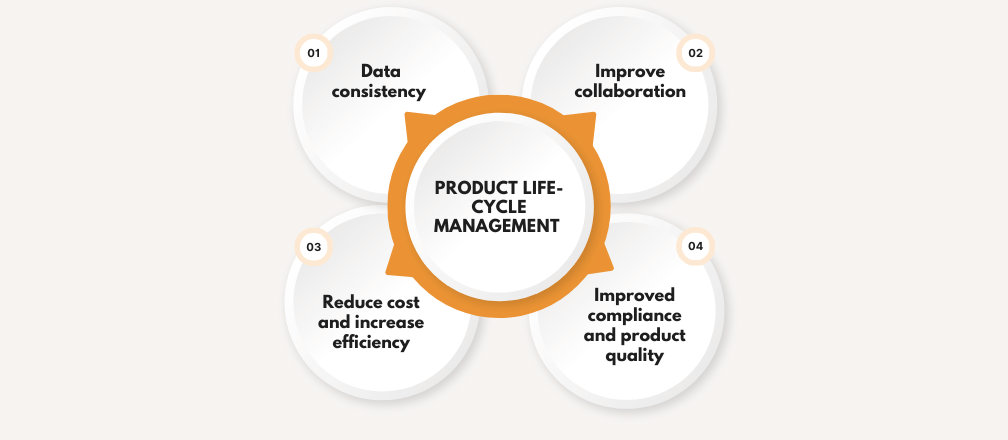How ERP impact product life cycle management: Benefits & Features

Today, we are a part of a fast-paced market. In such a competitive market, it is important for product-based businesses to make strategic decisions. Integration of technology systems. Technologies like Enterprise Resource Planning are not only just advantages but it is known to be an essential aspect for businesses who want to improve product management and operational efficiency.
ERP solutions have been designed in a way to streamline overall internal processes by integrating several business functionalities into a unified platform. As it helps to connect different teams and data throughout the organization, the ERP system facilitates a proper approach to product life-cycle management. It can enhance the overall efficiency from product creation to delivery.
Let us take a look into the major benefits of integration of advanced ERP solutions in product life-cycle management.

-
Data consistency and streamlined operations:
One of the biggest advantages of choosing an ERP solution is the availability of centralizing data. It helps businesses to get rid of data silos and make sure of consistency in different stages of product life-cycle. Therefore, such an integration will provide real-time access to data, which is essential for businesses when it comes to making informed decisions and reducing time to market.
-
Improve collaboration:
Integrating ERP in product life-cycle management can help companies leverage the potential of improved cooperation in different aspects of the department. The unified approach can help businesses where everyone from sales to design is working for a common goal. Therefore, it ensures efficient and faster product development.
-
Reduce cost and increase efficiency:
ERP systems are designed to automate major processes like procurement, inventory management, and production planning. Therefore, it becomes easier for businesses to manage the core tasks. Automation not only speeds up the overall operational aspects but also reduces the chances of manual errors and overall operational costs.
-
Improved compliance and product quality:
Integration of ERP systems among organizations can help manage some of the most important aspects, such as compliance and quality control. As it keeps an eye on the product life-cycle throughout, it helps businesses to keep an eye on and ensure meeting the standards. It can be achieved by tracking the production process, compliance data, and materials in detail to ensure that the products meet the required regulations and standards.
Core features of ERP that have an impact on product life-cycle management:
-
Reporting and analytics:
ERP systems have been designed in a way to provide powerful reporting and analytical tools. It, therefore can help businesses to seamlessly monitor performance and also make decisions based on data. The tools provide comprehensive insight into several aspects of the product life-cycle, from financial performance to resource allocation. Therefore, it helps in continuous improvement.
-
Integration capabilities:
The standout feature of ERP solution is the ability to easily integrate a lot of other software. ERP systems can work with the software that the company is already using. Therefore, it will not require companies to go through a major transformation while enjoying the benefits of advanced ERP solutions. The integration is crucial to ensure process efficiency and seamless data flow in different stages of the product life cycle.
-
Automation:
One of the major features of ERP is automation, which reduces the need for manual data entry. It allows businesses to shift human talent and let them focus on strategic tasks. The automated aspect of ERP solutions not only speeds up the procedure but also reduces the chances of human error. It, therefore, contributes to overall operational efficiency.
Conclusion:
As the number of product-related businesses is constantly increasing, it is also resulting in increased computation. Such a scenario requires companies to have knowledge about how to manage product life cycles. Integration of advanced ERP solutions, which have been designed with features and can be customized according to unique business requirements, can have a great advantage for the company.
At Cognisant, we have been working with ERP solutions for decades now to ensure the implementation of the right ERP solution. We ensure that the requirements are customized upon understanding your business to ensure that our solution has a clear impact on product life cycle management. You can get in touch with us for a consultation so that we can understand your core business and find better ways to implement and leverage the potential.

